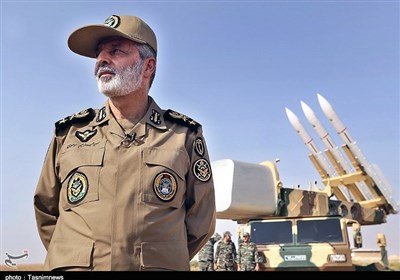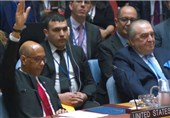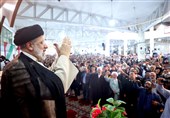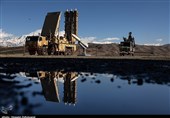Xi Becomes China's Most Powerful Leader since Mao after Change to Constitution
TEHRAN (Tasnim) - Xi Jinping has been consecrated as China’s most powerful leader since Mao Zedong after a new body of political thought carrying his name was added to the Communist party’s constitution.
The symbolic move came on the final day of a week-long political summit in Beijing – the 19th party congress – at which Xi has pledged to lead the world’s second largest economy into a “new era” of international power and influence, The Guardian reported.
At a closing ceremony in the Mao-era Great Hall of the People on Tuesday it was announced that Xi’s Thought on Socialism with Chinese Characteristics for a New Era had been written into the party charter.
“The congress unanimously agrees that Xi Jinping Thought … shall constitute [one of] the guides to action of the party in the party constitution,” a party resolution stated.
In a brief address to more than 2,200 delegates, Xi said: “Today we, more than 1.3bn Chinese people, live in jubilation and dignity. Our land ... radiates with enormous dynamism. Our Chinese civilization shines with lasting splendor and glamour.”
“Our party shows strong, firm and vibrant leadership. Our socialist system demonstrates great strength and vitality. The Chinese people and the Chinese nation embrace brilliant prospects,” Xi added.
Since the Communist party of China was founded in 1921, only one leader, Mao himself, has been honored in such a way while still alive, in his case with a political philosophy called Mao Zedong Thought.
Deng Xiaoping, the architect of China’s economic opening, also boasts a school of eponymous ideology in the party charter, Deng Xiaoping Theory, but that was included only after his death in 1997.
Bill Bishop, the publisher of the Sinocism newsletter on Chinese politics, said the birth of Xi Jinping Thought confirmed the rare levels of power and prestige enjoyed by its creator. “It means Xi is effectively unassailable … If you challenge Xi, you are challenging the party – and you never want to be against the party.”
Jude Blanchette, an expert in Chinese politics from New York’s Conference Board research group, said: “This is about amassing power and credibility and legitimacy and authority within the system to drive through more effectively what he sees as the right path for China.
“If you tower above the party, then it is very difficult for anyone below you to decide they don’t want to implement your commands.”
Writing in the Financial Times, Australia’s former Prime Minister Kevin Rudd said the fanfare around China’s leader suggested Xi, who took power in 2012 and had been expected to step down in 2022, would in fact rule well into the next decade. “Five years ago I said he would be China’s most powerful leader since Deng Xiaoping. I was wrong. He is now China’s most powerful leader since Mao Zedong,” Rudd wrote.
However, Susan Shirk, the head of the 21st Century China Centre at the University of California, San Diego, disputed the portrayal of Xi as an almighty Mao-like figure.
“He’s ruling differently, for sure, and people are intimidated by him because of the anti-corruption campaign.” But Shirk said she was reserving judgment on whether Xi was attempting “a real dictatorial play” until the new line-up of China’s top ruling council, the politburo standing committee, was announced on Wednesday.
If that committee included at least one of three possible successors – Hu Chunhua, Chen Min’er or Zhang Qingwei – that would signal Xi’s intention to step down in 2022, she said. If no clear successor emerged, however, it would fuel fears that Xi was “going for broke, all-out to be a dictator” and planned to remain in power indefinitely.
“I’m prepared to call him a dictator after that. But I am waiting to see,” said Shirk, US deputy assistant secretary of state under Bill Clinton.
Xi has been the focus of a chorus of songs of praise since the congress began last week.
Chen Quanguo, the party chief of Xinjiang, hailed his leader’s teachings as “intellectually incisive, visionary and magnificent”. Jilin province’s party boss, Bayanqolu, went even further. “General Secretary Xi Jinping is … the party’s helmsman,” he gushed, deploying a term famously used to hail Mao.
Blanchette said such displays of loyalty were “a striking indication of just how singular the party is under Xi”.
He added: “We are not at the point, like in the Cultural Revolution, where mangoes that Mao Zedong touched are worshipped. But we are certainly seeing a movement towards a new type of politics … one that is borrowing heavily from [the Mao era].”
Bishop said two factors explained Xi’s emergence as one of the most dominant figures in modern Chinese history. One was the 64-year-old’s own ambition. “Xi is sort of a Chinese Machiavelli”, who grew up in a revolutionary family hearing tales of Mao’s legendary political maneuverings. “A lot of that stuff must have sunk in,” Bishop said.
But Xi’s rise also reflected a broader consensus within the party that a strongman was needed to help China avoid a Soviet-style collapse. In 2012, on the eve of Xi taking power, Bishop said there had been a sense among China’s political elites that “if Xi didn’t clear things up, then the place was going to implode and the Communist party was done”.
Back then, a common refrain was: “Xi is our last hope.”
On Tuesday, Xi pitched himself as the leader of a “sacred” mission to restore China to its rightful place in the world.
“Living in such a great era, we are all the more confident and proud, and also feel the heavy weight of responsibility upon us,” he said. “We must have the courage and resolve to build on the historic achievements made by the Chinese people under the leadership of the Chinese Communists generation after generation, create new accomplishments befitting this great epoch and stride forward to an ever promising future.”
In a triumphalist editorial published shortly after Xi’s closing address, the party’s official news agency, Xinhua, said the advent of Xi Thought underlined how China was now rising “like never before”.
“China is set to regain its might and re-ascend to the top of the world,” it boasted. “Those expecting China to fall will be disappointed. Finger pointing and questioning the legitimacy of the Chinese way are of no avail. It is time to understand China’s path, because it appears it will continue to triumph.”
Outside the Great Hall of the People, delegates and members of the public gave Xi’s elevation the thumbs up.
“It’s very exciting. We really need a new guide for a new era,” said Li Wanjun, a delegate from the north-eastern province of Jilin.
Lin Xingyuan, a 35-year-old IT worker who was queuing to enter Tiananmen Square, agreed.
“It’s very inspiring,” he said, before being cut off by a green-clad member of the Communist party’s People’s Armed Police force who said interviews were forbidden in the area.






